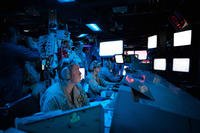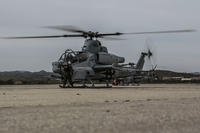Lindsey Graham, the Republican senator from South Carolina and GOP presidential hopeful, said he would increase the U.S. military presence in Iraq to about 10,000 troops if elected to the office.
In a speech Wednesday at the Atlantic Council in Washington, D.C., Graham, a member of the Senate Armed Services Committee, blasted the Obama administration's strategy in the Middle East and said the roughly 3,500 American service members in Iraq today are "too few to do what we need to do."
"If I were president of the United States, I would follow Jack Keane's advice and I would increase ground forces on the U.S. side inside of Iraq," he added, referring to the retired four-star general and former vice chief of staff of the Army who has pushed for a more robust U.S. military presence in the country. "We'd go to approximately 10,000."
American troops in Iraq serve primarily as advisers and trainers to Iraqi and Kurdish forces in Baghdad and Irbil who have struggled to thwart gains made by Islamic militants affiliated with the Islamic State in Iraq and Syria, or ISIS. Graham said he'd expand the U.S. military footprint to include special operations forces, forward-air controllers, intelligence officials, and attack helicopter pilots.
"That special forces component would hunt the leadership of ISIL morning, noon and night -- not just a single raid, but multiple raids," he said, referring to another name for ISIS.
"There would be forward air controllers to make sure we actually drop bombs on the right targets," Graham said. "There would be an intelligence capability that we don't have today. There'd be a couple battalions of aviation assets, attack helicopters, to back up the Iraqi army so they'd have a decisive advantage. And we'd have trainers and advisers embedded at the battalion level so that the Iraqi army would not cut and run."
ISIS militants have taken over large areas of Iraq and Syria. In the process, they've acquired U.S. military weapons and equipment, such as Humvees and M1 Abrams tanks, from bases where Iraqi forces fled. The fighters now control major cities, including Mosul in northern Iraq and Ramadi in the central part of the country.
After completely withdrawing U.S. troops from Iraq in 2011, President Obama last summer ordered troops back to the country as part of an air campaign against ISIS targets in Iraq and later Syria. The terrorist group responded by circulating videos depicting the executions of prisoners, including the beheading of American aid worker and former Army Ranger Peter Kassig and others.
Graham also called for sending about 10,000 American troops into Syria as part of a regional security force.
"The strategy articulated by President Obama to degrade and destroy ISIL doesn't have a snowball's chance in hell of working," he said. "You have to look at Iraq and Syria as a single battlespace. If you do not, you're making a very big mistake. You will never bring stability to Iraq unless you deal with the Syrian safe havens. The capital of the caliphate is inside Syria, not Iraq."
Defense hawks have called for as many as 20,000 U.S. troops to return to the Iraq, in addition to the deployment of such equipment as unmanned aerial vehicles, AH-64 Apache attack helicopters and C-130 Hercules transport planes.
U.S. defense analysts and military leaders such as Army Chief of Staff Gen. Ray Odierno have opposed sending American combat troops to the country, in part because the Shiite-led government in Baghdad remains at odds with Sunni, Kurd and other minority groups throughout the country.
"I absolutely do not agree right now with us putting U.S. forces on the ground and I am adamant about that and I think it would not be helpful at all," he told reporters last month.
Graham also called for keeping roughly 10,000 American troops in Afghanistan and warned that reducing that figure to as few as 1,000 service members would amount to a "mistake for the ages."
--Brendan McGarry can be reached at brendan.mcgarry@military.com




























